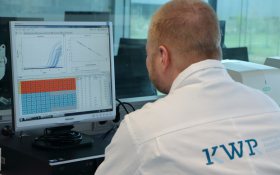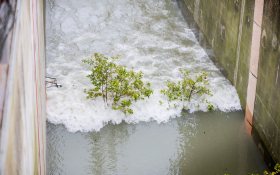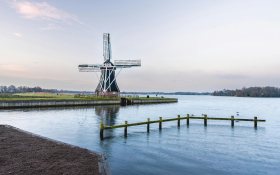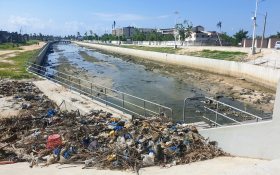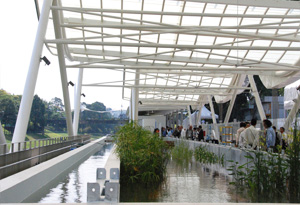Singapore water minister Vivian Balakrishnan opens Singapore-Delft Aquatic Science Centre
There is now a new research facility in Singapore where in-depth studies on urban freshwater management can be carried out on site. The Aquatic Science Centre (ASC) Sungei Ulu Pandan, the first such centre in Asia, was officially launched by the Singapore-Delft Water Alliance (SDWA), a research centre jointly supported by NUS, Singapore's national water agency PUB and Dutch research institute Deltares, on 6 July 2011.
Find solutions to keep catchments clean
At the opening ceremony, Dr Vivian Balakrishnan, Singapore Minister for the Environment and Water Resources said: "The Centre's research findings will help PUB develop sustainable solutions to keep our waterways and catchments clean and attractive. This is crucial for Singapore where two-thirds of our land area is now water catchment."
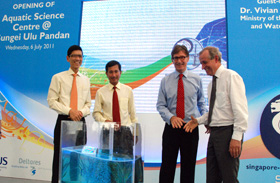
(From left) NUS President professor Tan Chorh Chuan, Singapore Minister Dr Vivian Balakrishnan,
Ambassador of the Netherlands to Singapore H E Johannes Jansing and
Managing Director of Deltares Mr Harry Baayen at the opening ceremony.
Applied research in Singapore and Delft
Elaborating on the facility's research work, NUS President Prof Tan Chorh Chuan said: "SDWA brings fundamental and applied research carried out at NUS and in Delft together with users of the research at PUB, who are largely shaping the SDWA research agenda. SDWA is one of those truly multi-disciplinary alliances which bring experts from diverse fields ranging from engineering to biology, chemistry to geography, public policy to environmental sciences."
Indor eco-toxicology laboratory
The S$6.4 million ASC is well-equipped with an indoor environmental and eco-toxicology laboratory for analysing environmental samples as well as a cutting-edge outdoor laboratory working space. It also boasts of a 95-metre long wave-like transparent roof, rain water collection and in-house waste water treatment capabilities.
Experimental channel
Projects of SDWA, which is headed by Assoc Prof Vladan Babovic, include the 34-metre long bio-flume, an experimental channel able to model near-natural flow conditions and its impact on changes and variability in nutrient conditions. The bio-flume, Asia's first such channel, allows the speed of water to be adjusted and plants to grow, thus enabling discovery of the types of plants which can help mitigate floods while cleaning stormwater.
Besides state-of-the-art research laboratories, the Aquatic Science Centre also serves as a public education facility. And as an eco-friendly building, it was awarded the Green Mark for Buildings (GoldPlus) rating by the Building and Construction Authority of Singapore in May this year.
This news item was originally published on the website of the
National University of Singapore.
More information on the
Aquatic Science Centre.
